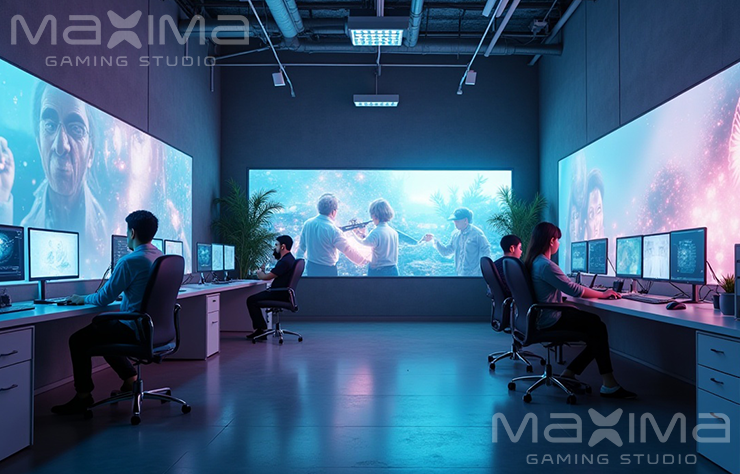 February 11, 2023
February 11, 2023
The Future of Game Development with Artificial Intelligence
The gaming industry is witnessing one of its most revolutionary transformations ever — powered by Artificial Intelligence (AI). From creating richer, more immersive worlds to streamlining production workflows, AI is reshaping how games are developed and experienced. As we move further into 2025, AI’s role in game development is not just growing; it’s becoming fundamental.
This article explores how AI is currently used in game development, the tools transforming the industry, challenges ahead, and what the future holds for developers and players alike.
Current Uses of AI in Game Development
Procedural Content Generation
One of the earliest and most impactful uses of AI in games has been procedural content generation (PCG). AI algorithms generate landscapes, levels, maps, quests, and even entire game worlds dynamically. This approach significantly reduces development time and offers players unique experiences each time they play. Games like No Man’s Sky and Minecraft have shown the power of PCG, and AI-driven techniques now make this process smarter and more adaptive.
AI-Driven NPC Behavior
Gone are the days of static, predictable Non-Player Characters (NPCs). AI enables NPCs to learn from player actions, adapt strategies, and provide challenging, lifelike interactions. Machine learning models help NPCs respond intelligently to player tactics, creating a more immersive and engaging gameplay experience.
Automated Testing and Quality Assurance
Game testing, traditionally a labor-intensive process, benefits greatly from AI. Automated bots simulate diverse player behaviors to uncover bugs and balance issues rapidly. AI-driven testing tools accelerate QA cycles and reduce costs, allowing developers to release polished products faster.
Personalized Player Experiences
AI helps tailor game experiences to individual players by analyzing gameplay data in real-time. Adaptive difficulty levels, personalized content suggestions, and dynamic storytelling adjust to player preferences, making games more engaging and reducing churn.
How AI is Transforming Game Design and Production
Speeding Up Asset Creation
Creating high-quality game assets—characters, environments, animations—is time-consuming. AI-powered tools now generate detailed 3D models, textures, and animations from simple inputs, freeing artists to focus on creative direction rather than repetitive tasks.
Enhancing Game Balance and Difficulty
Machine learning models analyze vast amounts of player data to find the optimal game balance. They help designers tweak mechanics to ensure challenges are fair yet exciting, increasing player retention.
Automating Coding and Bug Detection
AI code assistants, similar to GPT-based tools, help developers write efficient code, detect bugs early, and suggest improvements. This boosts productivity and reduces errors, especially in complex game systems.
AI Tools and Technologies Popular in 2025
- Unity ML-Agents: Integrates machine learning with Unity games to create smarter NPCs and adaptive gameplay.
- GPT and Codex: AI models that assist in generating code snippets, dialogue, and narrative content.
- Generative Adversarial Networks (GANs): Used for creating realistic textures, character faces, and environments.
- AI-driven Analytics Platforms: Provide insights on player behavior and monetization effectiveness.
Developers today harness these tools not just to speed production but to push creative boundaries previously unimaginable.
Challenges and Ethical Considerations
While AI offers tremendous benefits, developers must navigate several challenges:
- Data Privacy: AI relies on large datasets, including player data. Ensuring privacy and consent is paramount.
- Creative Balance: Over-reliance on AI risks homogenizing games and stifling human creativity. Developers must maintain a healthy synergy between AI and artistic vision.
- Job Impact: AI will automate certain tasks, shifting required skillsets. Upskilling and evolving roles are essential for the workforce.
- Fairness and Transparency: AI systems must avoid biases that could harm player experience or accessibility.
Future Trends and Predictions
Looking ahead, AI’s role in game development will deepen dramatically:
- End-to-End AI Design: Entire games designed, tested, and iterated by AI with human guidance.
- Dynamic Worlds: Real-time AI adapts game environments and storylines based on player choices and behavior.
- Player-AI Collaboration: Players and AI-controlled characters working together, creating new multiplayer experiences.
- Enhanced Virtual Reality (VR) and Augmented Reality (AR): AI enabling more immersive and interactive experiences.
Conclusion
Artificial Intelligence is not just a tool but a transformative partner in game development’s future. As AI continues to evolve, it empowers developers to create richer, more personalized, and innovative gaming experiences. For studios and indie developers alike, embracing AI is no longer optional—it’s essential to stay competitive and push the boundaries of what games can be.
The future of game development with AI is bright, and those who adapt early will lead the next wave of gaming innovation.


